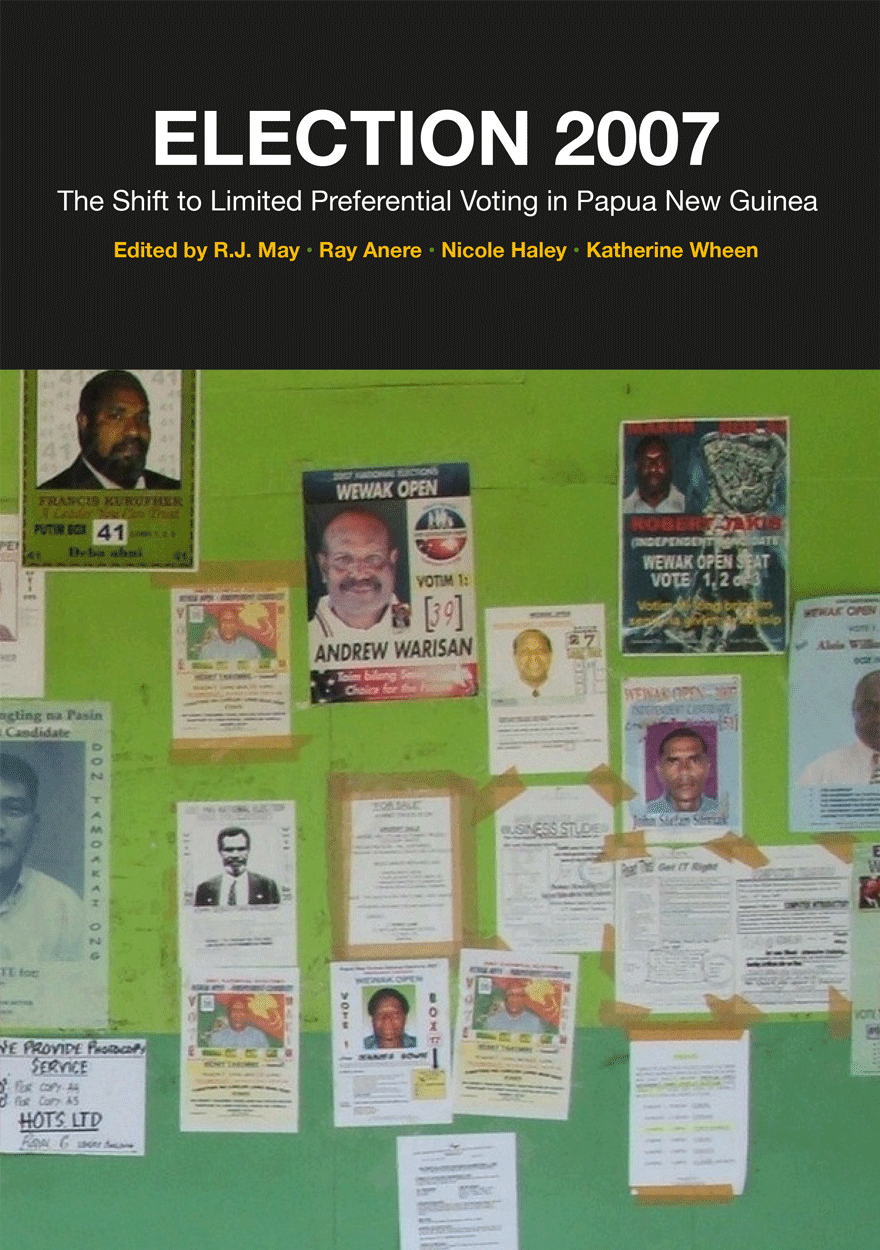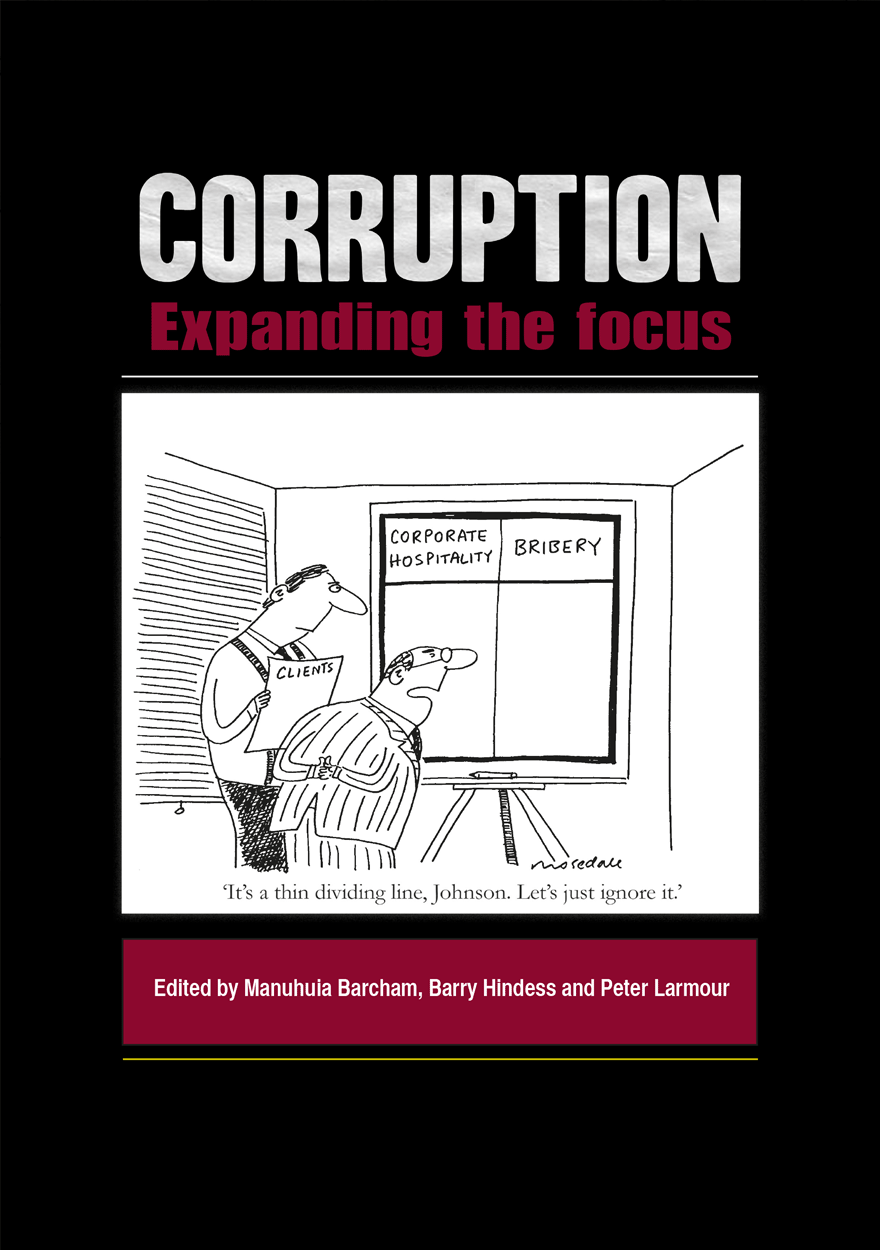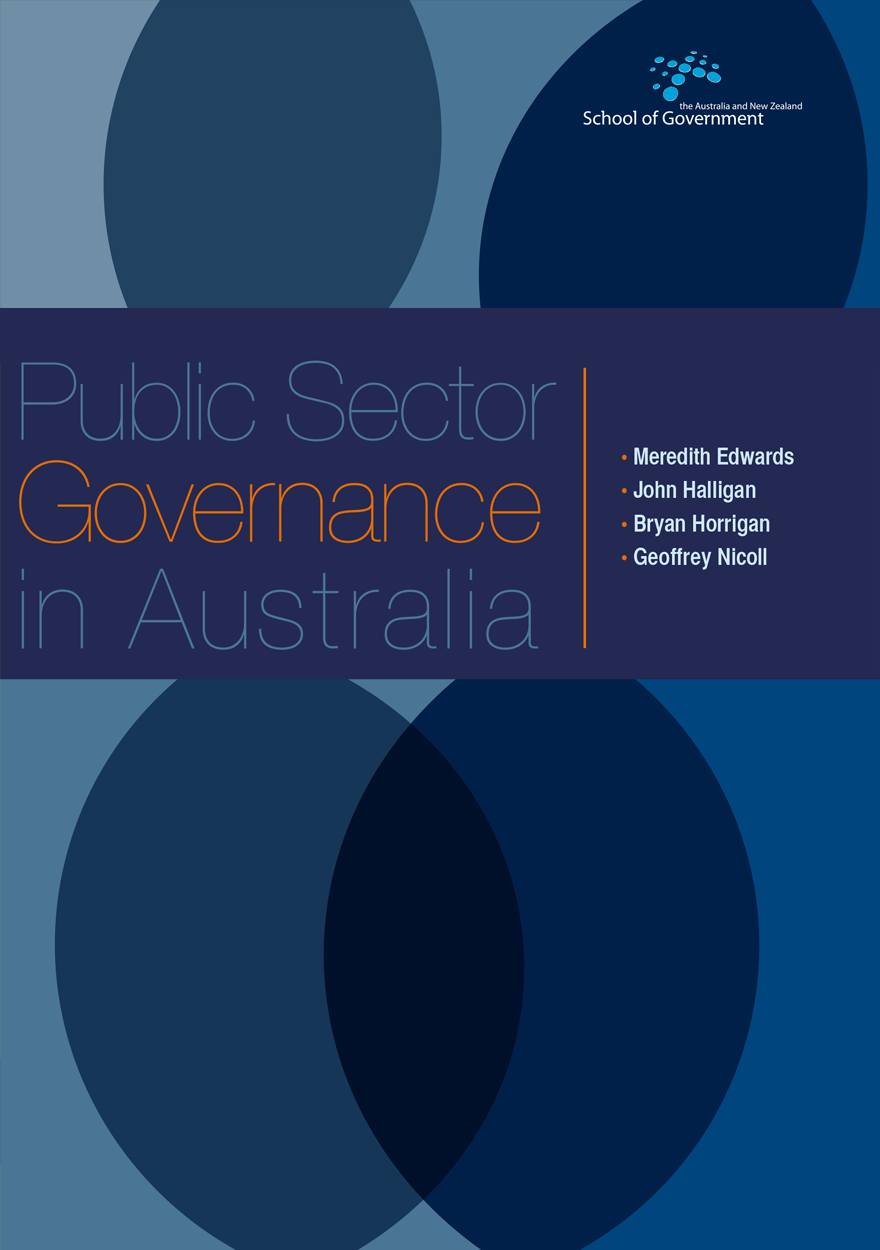Books
Browse or search ANU Press' range of books or find out more about the publications' authors and co-publishers. Download the book for free or buy a print-on-demand copy.
Displaying results 21 to 30 of 67.

Civic Insecurity »
Law, Order and HIV in Papua New Guinea
Edited by: Vicki Luker, Sinclair Dinnen
Publication date: December 2010
Papua New Guinea has a complex ‘law and order’ problem and an entrenched epidemic of HIV. This book explores their interaction. It also probes their joint challenges and opportunities—most fundamentally for civic security, a condition that could offer some immunity to both.
This book is a valuable and timely contribution to a limited but growing body of scholarship in the social and structural contexts of HIV epidemiology in Papua New Guinea. The volume offers a unique collection of interdisciplinary insights on the connections between law and order and the HIV epidemic and is presented in a manner accessible to a wide audience, scholars and lay people alike… Significantly, this is the first volume to critically examine the complex and inexorable links between HIV, gender, violence, and security within a theoretical framework that illuminates the challenges of the epidemic for PNG’s future cohesion and stability as a young nation…The importance of this courageous book cannot be overstated. While it communicates an urgent and potent message about the need for immediate action … it offers insightful reflections on the processes and possibilities of social transformation that undoubtedly will have enduring scholarly and practical value.
— Dr Katherine Lepani, Social Foundations of Medicine, The Australian National University.

Voluntary Assisted Dying »
Law? Health? Justice?
Edited by: Daniel J Fleming, David J Carter
Publication date: February 2022
Since the introduction of voluntary assisted dying in 2019, a ‘new moment’ in the governance of life and death has opened up within the Australian context. This new moment demands new questions be asked regarding the regime and its effects in this new era for law, health care and justice.
This collection brings together critical perspectives on voluntary assisted dying itself, and on various practices adjacent to it, including questions of state power, population ageing, the differential treatment of human and non-human animals at the time of death, the management of health care processes through silent ‘workarounds’, and the financialisation of death.
This book provides an overview of the first Australian regime, and then introduces these diverse critical views, broadening our engagement with euthanasia and voluntary assisted dying beyond the limited, but important, debates about law reform and its particular enactment in Australia.

What if we could reimagine copyright? »
Edited by: Rebecca Giblin, Kimberlee Weatherall
Publication date: January 2017
What if we could start with a blank slate, and write ourselves a brand new copyright system? What if we could design a law, from scratch, unconstrained by existing treaty obligations, business models and questions of political feasibility? Would we opt for radical overhaul, or would we keep our current fundamentals? Which parts of the system would we jettison? Which would we keep? In short, what might a copyright system designed to further the public interest in the current legal and sociological environment actually look like?
Taking this thought experiment as their starting point, the leading international thinkers represented in this collection reconsider copyright’s fundamental questions: the subject matter that should be protected, the ideal scope and duration of those rights, and how it should be enforced. Tackling the biggest challenges affecting the current law, their essays provocatively explore how the law could better secure to creators the fruits of their labours, ensure better outcomes for the world’s more marginalised populations and solve orphan works. And while the result is a collection of impossible ideas, it also tells us much about what copyright could be – and what prescriptive treaty obligations currently force us to give up. The book shows that, reimagined, copyright could serve creators and the broader public far better than it currently does – and exposes intriguing new directions for achievable reform.

Dealing with Uncertainties in Policing Serious Crime »
Edited by: Gabriele Bammer
Publication date: May 2010
Grappling with uncertainties is at the heart of investigating serious crime. At a time when such crime is becoming more complex and resources are increasingly stretched, this book draws together research and practice perspectives to review fruitful approaches to uncertainties and to chart the way forward. Scene setting chapters describe the consequences of globalisation and the spread of sophisticated information technologies (Sue Wilkinson), as well as advances in understanding and managing uncertainty (Michael Smithson). Ways of enhancing responses from statistics (Robyn Attewell), risk analysis (Richard Jarrett and Mark Westcott) and the psychology of decision making (Mark Kebbell, Damon Muller and Kirsty Martin) follow. These are complemented by insights from law (the Hon. Tim Carmody SC), politics (the Hon. Carmen Lawrence) and business (Neil Fargher), which all have significant intersections with policing. Synthesis is provided by the four final chapters which present the outlooks of the investigating officer and investigation manager (Peter Martin), the provider of policing higher education (Tracey Green and Greg Linsdell), the capacity-building consultant (Steve Longford), and the leader of a law enforcement agency (Alastair Milroy).

Macrocriminology and Freedom »
Authored by: John Braithwaite
Publication date: February 2022
How can power over others be transformed to ‘power with’? It is possible to transform many institutions to build societies with less predation and more freedom. These stretch from families and institutions of gender to the United Nations. Some societies, times and places have crime rates a hundred times higher than others. Some police forces kill at a hundred times the rate of others. Some criminal corporations kill thousands more than others. Micro variables fail to explain these patterns. Prevention principles for that challenge are macrocriminological.
Freedom is conceived in a republican way as non-domination. Tempering domination prevents crime; crime prevention reduces domination. Many believe a high crime rate is a price of freedom. Not Braithwaite. His principles of crime control are to build freedom, temper power, lift people from poverty and reduce all forms of domination. Freedom requires a more just normative order. It requires cascading of peace by social movements for non-violence and non-domination. Periods of war, domination and anomie cascade with long lags to elevated crime, violence, inter-generational self-violence and ecocide. Cybercrime today poses risks of anomic nuclear wars.
Braithwaite’s proposals refine some of criminology’s central theories and sharpen their relevance to all varieties of freedom. They can be reduced to one sentence. Strengthen freedom to prevent crime, prevent crime to strengthen freedom.
‘A true magnum opus, Macrocriminology and Freedom is a thought provoking and generative book from one of criminology’s intellectual giants. John Braithwaite reaches far and wide across societies, time, and disciplines to advance no less than a theory of how to build a society that simultaneously reduces both domination and crime. His ambitious ideas on cascades of non-dominating collective efficacy and crime prevention, for example, and their connections to social movements and political freedom, go well beyond usual criminological discourse. Chock full of theoretical propositions and bold insights, this a book that will keep criminologists busy for years. Macrocriminology and Freedom should not just be read, but better yet, savoured.’
– Robert J. Sampson, Henry Ford II Professor of the Social Sciences, Harvard University
‘In this majestic theorisation of the relationship between crime and freedom John Braithwaite isolates the unique power of macrocriminology as a lens through which to comprehend and challenge many of the fundamental crises facing our planet. Very few scholars have the breadth and overview to succeed in a mission of this order … Braithwaite does. This extraordinary book is an object lesson for all who seek to understand and resist domination and the crimes of power that flow from it.’
– Penny Green, Professor of Law and Globalisation, Queen Mary University of London
‘For over 40 years, John Braithwaite has been a voice of wisdom, hope and humanity in criminology. This dazzling new book weaves together all the main themes of his influential work, reanimating many of the core concepts of the discipline, as well as incorporating interdisciplinary resources from south and north, east and west, to produce an elegant and ambitious explanatory and normative account of crime as freedom-threatening domination. Decentring criminal justice as the solution to crime, Braithwaite shows that, on a global scale, the aspiration to tackle crimes, ranging from interpersonal violence through corporate crimes to ecocide, lies in the development of freedom-enhancing, power-tempering institutions in the political, economic and social spheres.’
– Nicola Lacey, Professor of Law, Gender and Social Policy, London School of Economics
‘Macrocriminology and Freedom is a criminological epic, an expansive and erudite story that sweeps across history and contexts. The book is frightening in showing how cascading events can produce catastrophes from crime to environmental destruction. But in the end, its message is hopeful, identifying pathways—or “normative rivers”—for guiding freedom from domination and crime. Drawing on his distinguished career, John Braithwaite has bestowed an extraordinary gift—a book, like other masterpieces, that will yield special insights each time we take an excursion through its pages.’
– Francis T. Cullen, Distinguished Research Professor Emeritus, University of Cincinnati
‘In this engaging book John Braithwaite reinvigorates discussions about crime and its control. While advocating a macro approach, the book is punctuated not only with insights and data from smaller-scale studies conducted in a range of jurisdictions, but also with auto-biographical vignettes. The effect creates a deeply personal account of the perils of state, non-state and market violence and authoritarianism and the potential and indeed duty, of criminologists to work towards their reduction, by refocusing their efforts on explaining and tackling crime in its myriad of forms.’
– Mary Bosworth, Professor of Criminology, University of Oxford and Monash University
‘John Braithwaite has had a unique influence on criminology globally. In this encyclopaedic text he synthesises a wealth of criminological knowledge, particularly in the sphere of anomie theory, into broader debates about the nature of domination and freedom in contemporary society. He defends the relevance of criminological theory, while urging criminology to be activist rather than reactive and technocratic, counter-hegemonic rather than neutral. Not for the first time, John Braithwaite has challenged criminologists to construct theories that cut across micro and macro structures. This book will stir debate. It deserves a broad readership.’
– Harry Blagg, Professor of Criminology, University of Western Australia

Making Copyright Work for the Asian Pacific »
Juxtaposing Harmonisation with Flexibility
Edited by: Susan Corbett, Jessica Lai
Publication date: October 2018
This book provides a contemporary overview of developing areas of copyright law in the Asian Pacific region. While noting the tendency towards harmonisation through free trade agreements, the book takes the perspective that there is a significant amount of potential for the nations of the Asian Pacific region to work together, find common ground and shift international bargaining power. Moreover, in so doing, the region can tailor any regional agreements to suit local needs. The book addresses the development of norms in the region and the ways in which this can occur in light of the specific nature of the creator–owner–user paradigm in the region and the common interests of Indigenous peoples.

Timor-Leste's Bill of Rights »
A Preliminary History
Authored by: Annemarie Devereux
Publication date: May 2015
The Constitution of the Democratic Republic of Timor-Leste of 2002 contains over 40 human rights provisions in its Bill of Rights. In addition to providing an overview of the process leading up to the adoption of the Constitution, this book brings together information relating to each section of the Bill of Rights, presenting:
progressive texts produced during the process of the Constituent Assembly;
highlights of the arguments put forward within the Constituent Assembly concerning the draft provisions, including alternative proposals advanced;
submissions made by Timorese officials, civil society and international bodies; and
the results of consultation with the broader community before and during the constitutional process.
It is designed to be useful in particular to judges and legal practitioners called upon to interpret the Constitution, government officials and civil society actors involved in human rights work, as well as students of history and constitutional law in Timor-Leste and internationally.

Election 2007 »
The Shift to Limited Preferential Voting in Papua New Guinea
Edited by: R.J. May, Ray Anere, Nicole Haley, Katherine Wheen
Publication date: September 2013
Papua New Guinea’s general election in 2007 attracted particular interest for several reasons. Not only did it follow what was widely acknowledged as the country’s worst election ever, in 2002 (in which elections in six of the country’s 109 electorates were declared to be ‘failed elections’), it was the first general election to be held under a new limited preferential voting system. It also followed the first full parliamentary term under the Organic Law on the Integrity of Political Parties and Candidates, which had been introduced in 2001 in an attempt to strengthen political parties and create a greater degree of stability in the national parliament, and was the first to embrace a ‘whole-of-government’ approach to electoral administration, through an Interdepartmental Electoral Committee. This volume provides an analysis of the 2007 election, drawing on the work of a domestic monitoring team organized through the National Research Institute, and several visiting scholars. It addresses key issues such as voter education, electoral administration, election security, the role of political parties, women as candidates and voters, the shift to limited preferential voting, and HIV transmission, and provides detailed accounts of the election in a number of open and provincial electorates. It is generally agreed that the election of 2007 was an improvement on that of 2002. But problems of electoral administration and voting behaviour remain. These are identified in this volume, and recommendations made for electoral reform.

Corruption »
Expanding the Focus
Edited by: Manuhuia Barcham, Barry Hindess, Peter Larmour
Publication date: September 2012
Recent years have seen an unprecedented rise in interest in the topic of corruption, resulting in a rising demand for suitable teaching materials. This edited collection brings together two different approaches to the study of corruption — the first represented by a large, practically-oriented literature devoted to identifying the causes of corruption, assessing its incidence and working out how to bring it under control; the second by a smaller collection of critical literature in political theory and intellectual history that addresses conceptual and historical issues concerned with how corruption should be, and how it has been, understood — and uses the second to reflect on the first.
This collection will be of interest to post-graduate students in political science, law, sociology, public policy and development studies, to senior public servants, and to professionals working in multilateral agencies, NGOs and the media.

Public Sector Governance in Australia »
Authored by: Meredith Edwards, John Halligan, Bryan Horrigan, Geoffrey Nicoll
Publication date: July 2012
Australia lacks a scholarly book that covers recent developments in public sector governance in Australia and blends cross-disciplinary perspectives from law, management, public administration and public policy. The primary reason for writing this book is to fill the gap in the treatment of this subject, and to provide insights from empirical evidence and current practice.
The book provides the first comprehensive theoretical and empirical work on governance in the Commonwealth public sector. It addresses the issues that emerged under the Howard government as well as their handling under the Rudd and Gillard governments. The book aims to enhance understanding of and communication about public governance across government, industry and the community.
The authors bring to this book expertise gained from political science, public administration and policy, public and private sector law.



